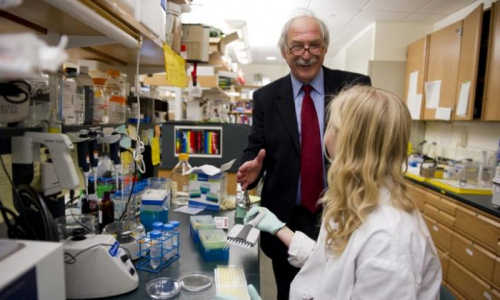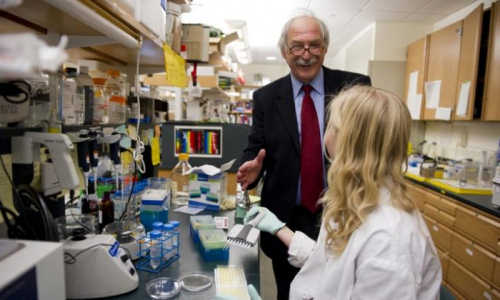Michail Sitkovsky, an immunophysiology expert at Northeastern University, and his research colleagues have made a breakthrough discovery in cancer treatment. The new approach, some 30 years in the making, could dramatically increase the survival rate of patients with cancer, which kills some 8 million people each year.
‘This discovery shifts the paradigm of decades-long drug development’. Photo Credits: Brooks Canaday/Northeastern University
The findings were published Wednesday in Science Translational Medicine, an interdisciplinary medical journal founded in 2009 by the American Association for the Advancement of Science.
Sitkovsky et al. found that supplemental oxygenation inhibits the hypoxia-driven accumulation of adenosine in the tumor microenvironment and weakens immunosuppression. This, in turn, could improve cancer immunotherapy and shrink tumors by unleashing anti-tumor T lymphocytes and natural killer cells.
“This discovery shifts the paradigm of decades-long drug development, a process with a low success rate,” said Sitkovsky, the Eleanor W. Black Chair and Professor of Immunophysiology and Pharmaceutical Biotechnology at Northeastern and the founding director of the university’s New England Inflammation and Tissue Protection Institute. “Indeed, it is promising that our method could be implemented relatively quickly by testing in clinical trials the effects of oxygenation in combination with different types of already existing immunotherapies of cancer.”
The paper–titled “Immunological mechanisms of the antitumor effects of supplemental oxygenation”–was the result of a robust interdisciplinary collaboration between doctors and researchers at some of the country’s most prestigious universities, hospitals, and medical schools. Co-authors comprised 12 researchers from NEITPI, the Northeastern-based consortium aimed at understanding the underlying causes and molecular mechanisms of inflammation; Barry Karger, the director of Northeastern’s Barnett Institute of Chemical and Biological Analysis; and doctors from the University of Pittsburgh School of Medicine, the University of Miami Miller School of Medicine, Brigham and Women’s Hospital, and the Dana-Farber Cancer Institute, where Sitkovsy holds an appointment as a presidential scholar.
The findings build upon Sitkovsky’s previous research and represent the culmination of his life’s work, which has been supported by Northeastern and the National Institutes of Health. In the early 2000s, Sitkovsky made an important discovery in immunology, which has come to inform his research in cancer biology. He found that a receptor on the surface of immune cells–the A2A adenosine receptor–is responsible for preventing T cells from invading tumors and for “putting to sleep” those killer cells that do manage to enter into the tumors.
His latest work shows that inhaling 40 to 60 percent oxygen–air offers 21 percent oxygen–weakened tumor-protecting signaling through the A2A adenosine receptor and awakened T cells that had gained the ability to invade lung tumors.
“Breathing supplemental oxygen opens up the gates of the tumor fortress and wakes up ‘sleepy’ anti-tumor cells, enabling these soldiers to enter the fortress and destroy it,” Sitkovsy explained. “However,” he added, “if anti-tumor immune cells are not present, oxygen will have no impact.”
Sitkovsky further noted that the effects of supplemental oxygenation might be even stronger in combination with a synthetic agent that he calls “super-caffeine,” which is known to block the tumor-protecting effects of the adenosine receptor. He and Graham Jones, professor and chair of Northeastern’s Department of Chemistry and Chemical Biology, are currently collaborating to design the next generation of this drug, which was originally developed for patients with Parkinson’s disease.
“The anti-tumor effects of supplemental oxygen can be further improved by the natural antagonist of the A2A adenosine receptor, which happens to be the caffeine in your coffee,” Sitkovsky said. “People drink coffee because caffeine prevents the A2A adenosine receptor in the brain from putting us to sleep.”
Story Source:
The above story is based on materials provided by Northeastern University.






